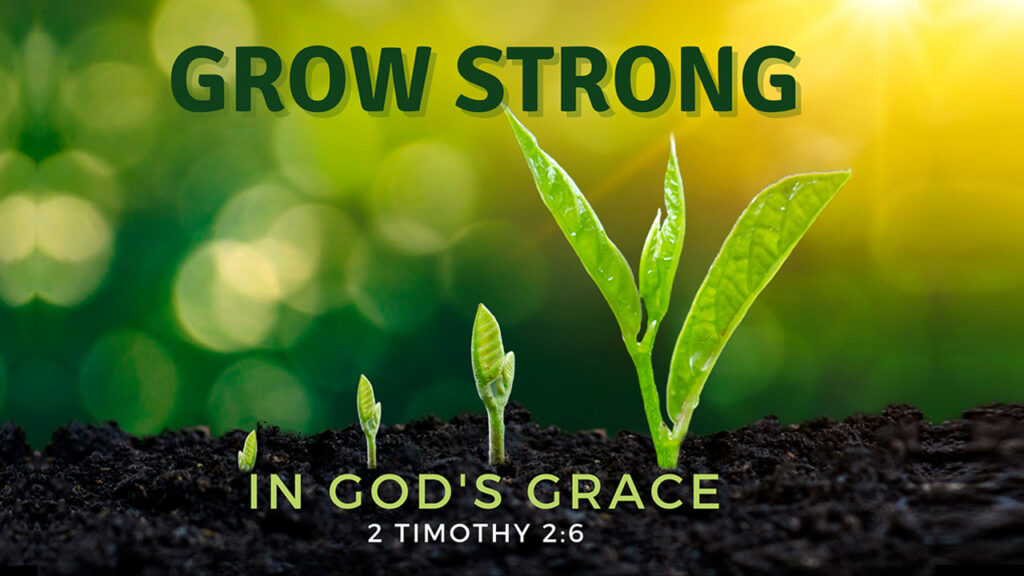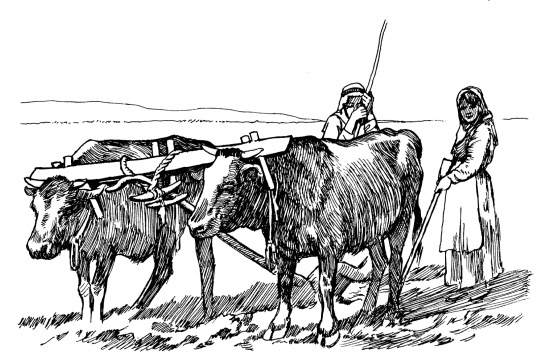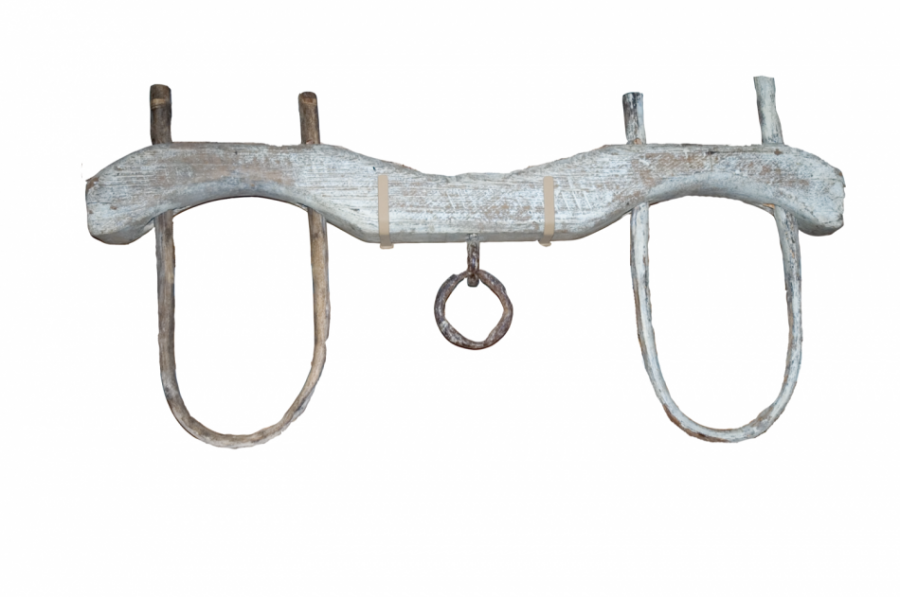
Grow Strong in God’s Grace – Wk 3

Grow Strong in God’s Grace: Learning How to be a Faithful Farmer for God’s Harvest!
Farming as an Everyday Illustration for the Spiritual Life!
John 15:1-8 & Matthew 11:28-30 (NAS95)
I have spent the last two Sundays cultivating the soil for this year’s sermon series, “Grow Strong in God’s Grace: Learning How to be a Faithful Farmer for God’s Harvest!” In the first week, we looked at what it means that we want to “Grow Strong in God’s Grace” from 2 Timothy 2:1-6. I connected this year’s series to the previous two years of teaching, which were also grounded in the teachings of Paul about how we are to live as faithful disciples of Jesus Christ by learning from the athlete in 2021, the soldier in 2022, and now the farmer in 2023.
Last week, we went deeper into the theme verse of 2 Timothy 2:6 to learn why Paul used the imagery of a hard-working farmer for the Christian life, and I started preparing you to see the richness of soil and efficacy of seed that God has given from His Word utilizes farming as an everyday illustration for the spiritual life. Today, I start a 5-Sunday emphasis on the teachings of Jesus so that we may learn exactly why and how Jesus used this imagery. From His teachings, we are going to learn over the next month the four steps every hard-working farmer must follow:
- Cultivate the soil.
- Sow the good seed.
- Care for the maturing plant.
- Reap a harvest.
We are going to see from Jesus’ teaching how these four steps are essential in the life of every disciple of Jesus Christ to learn how to be a faithful farmer for God’s harvest. It is important that you know that Paul was building upon the teachings of Jesus and using everyday cultural-relevant imagery to call forth faithful living to the Gospel of Jesus Christ. Paul was following in the footsteps of His master, and we are to do the same!
Let’s dive in and see what we can learn from two of my favorite farming illustration given to us by our Lord and Savior Jesus Christ. The first is from the Gospel of John 15:1-8, where Jesus taught using imagery from a vineyard, which was an agricultural image that already had deep religious meaning to the Jewish people to whom Jesus was speaking:
I am the true vine, and My Father is the vinedresser. Every branch in Me that does not bear fruit, He takes away; and every branch that bears fruit, He prunes it so that it may bear more fruit. You are already clean because of the word which I have spoken to you. Abide in Me, and I in you. As the branch cannot bear fruit of itself unless it abides in the vine, so neither can you unless you abide in Me. I am the vine, you are the branches; he who abides in Me and I in him, he bears much fruit, for apart from Me you can do nothing. If anyone does not abide in Me, he is thrown away as a branch and dries up; and they gather them, and cast them into the fire and they are burned. If you abide in Me, and My words abide in you, ask whatever you wish, and it will be done for you. My Father is glorified by this, that you bear much fruit, and so prove to be My disciples.
The most pressing need for the Christian’s ministry in and through the local church is that each follower of Jesus daily answers Jesus’ personal call to be His disciple, chosen and called by the Father, and operating in the sustaining power of the Holy Spirit. Above all other expectations, responsibilities, or demands placed upon you, this is your first calling. It is my desire, through this sermon series to call members of the body of Christ out of the perpetual spin cycle of the tyranny of the urgent and into the long obedience of the most important – the Harvest! Os Guinness reflected, “Calling is the truth that God calls us to himself so decisively that everything we are, everything we do, and everything we have is invested with a special devotion and dynamism lived out as a response to his summons and service.”[1] The Christian life and ministry flows out of the abundance of personal intimacy with Jesus Christ, from the Source of all lasting fruit. As Jesus said in John 15:8, “My Father is glorified by this, that you bear much fruit, and so prove to be My disciples.” An abiding relationship with Jesus that brings glory to God through your life and ministry is the essence of prioritizing the strengthening of your spiritual vitality above any measurable effectiveness in meeting the expectations of others.
Disciples of Jesus Christ must prioritize the harvest, but like I taught last week based on 2 Timothy 2:6, if you are going to work hard as a farmer, then you must make sure that the fruit you are reaping is something you first would bring home to your own family before you export it to other people’s families, communities, or nations. In today’s technological world, there are many people who are seeking to influence others and create platforms for themselves without going through the deep work of spiritual formation. Ultimately, let us never forget that you can teach people what you know, but you will only replicate what you are! There is much evidence of this as we experience leaders’ charisma outpacing their character, leading to scandals that are diminishing the name of Jesus, giving the church a black eye, and hindering the harvest work. If we have learned anything from Mars Hill, and the surrounding discussions in the contemporary church about toxic leadership, it is that the ends do not justify the means. God cares as much about the process as the fruit; in fact, the Bible teaches that God cares more about the process! Jesus overcommunicated this in his calling of the disciples in Matthew 16:24-26:
Then Jesus said to His disciples, “If anyone wishes to come after Me, he must deny himself, and take up his cross and follow Me. For whoever wishes to save his life will lose it; but whoever loses his life for My sake will find it. For what will it profit a man if he gains the whole world and forfeits his soul? Or what will a man give in exchange for his soul?”
The fruit that proves you are abiding in the vine of Jesus Christ is the fruit of the Spirit – “love, joy, peace, patience, kindness, goodness, faithfulness, gentleness, self-control; against such things there is no law. Now those who belong to Christ Jesus have crucified the flesh with its passions and desires” (Galatians 5:22-24). This is the maturity of a disciple who is putting on display (manifesting, proving) the fruit that Jesus Christ commands us to export to the nations for God’s glory. Jesus is the embodiment of the Father and the perfect example of God’s truth and grace, holiness and love, judgment and mercy (John 1:14; Colossians 1:15; 2:9). Jesus intimately knows God and invites people into this depth of relationship that God offers us – for a person to be in Him and for Him to be in the person, which is the abiding imagery of John 15:4-7:
Abide in Me, and I in you. As the branch cannot bear fruit of itself unless it abides in the vine, so neither can you unless you abide in Me. I am the vine, you are the branches; he who abides in Me and I in him, he bears much fruit, for apart from Me you can do nothing. If anyone does not abide in Me, he is thrown away as a branch and dries up; and they gather them, and cast them into the fire and they are burned. If you abide in Me, and My words abide in you, ask whatever you wish, and it will be done for you.
Jesus commands us to learn from Him and, in doing so, live our lives as He lived his life on Earth – submitted to His Father’s will and connected to His source of power. That is the exact point of the second farmer’s illustration I want to share with you, and many of you know this is my favorite of all the images Jesus gave us for the Christian life. It is from the Gospel of Matthew 11:28-30, where Jesus taught using imagery that would be seen six days a week on many family farms in every Jewish community – the yoked oxen working out in the field, which, like the vineyard, was an agricultural image that already had deep religious meaning to the Jewish people to whom Jesus was speaking, “Come to Me, all who are weary and heavy-laden, and I will give you rest. Take My yoke upon you and learn from Me, for I am gentle and humble in heart, and you will find rest for your souls. For My yoke is easy and My burden is light.” I was blessed to be able to watch a farmer yoke together two oxen at the Indiana State Fair last summer. What a treat! Listen to the power of Jesus’ illustration from a farmer’s perspective:
Typically a young, untrained ox is yoked with an older, trained ox. The younger learns from the older. If a trained ox can pull 5,000 pounds and an untrained ox can pull 2,000 pounds, together they can pull 10,000 pounds – much more than the sum of the two. Over time, the untrained ox becomes trained and the two begin to walk in-step with each other. Then they can pull 15,000 pounds.[2]
Jesus captured this picture for His Jewish audience with His graceful invitation to come to Him by taking His yoke upon themselves. Until a Christian submits to the direction and pace of Jesus’ life, and is willing to do nothing apart from Him, there is no good work that can be done through his or her ministry. Outside of the yoke of Jesus Christ or outside of the branch’s abiding connection to the vine, who is Jesus Christ, the Christian becomes a stumbling block to the harvest work of the church. As Andrew Murray wrote in Absolute Surrender,
Oh, become nothing in deep reality, and, as a worker, study only one thing – to become poorer and lower and more helpless, that Christ may work all in you. Workers, here is your first lesson: learn to be nothing, learn to be helpless. The man who has got something is not absolutely dependent; but the man who has got nothing is absolutely dependent. Absolute dependence upon God is the secret of all power in work. The branch has nothing but what it gets from the vine, and you and I can have nothing but what we get from Jesus.[3]

 Similarly, the yoke emphasizes that Jesus is bearing the burden of the work in and through a person’s life. In both conceptual metaphors, Jesus emphasized that it is not the disciple who is producing the results; rather, it is the Holy Spirit who is the One bearing the fruit. Once again, I turn to Andrew Murray, who nuanced the responsibility of the Holy Spirit’s role in the abiding relationship found in the vine and branch imagery. Listen closely to this amazing truth that he published in 1898:
Similarly, the yoke emphasizes that Jesus is bearing the burden of the work in and through a person’s life. In both conceptual metaphors, Jesus emphasized that it is not the disciple who is producing the results; rather, it is the Holy Spirit who is the One bearing the fruit. Once again, I turn to Andrew Murray, who nuanced the responsibility of the Holy Spirit’s role in the abiding relationship found in the vine and branch imagery. Listen closely to this amazing truth that he published in 1898:
A law can compel work: only love can spontaneously bring forth fruit. … It is only when good works come as the fruit of the indwelling Spirit that they are acceptable to God. Under the compulsion of law and conscience, or the influence of inclination and zeal, men may be most diligent in good works, and yet find that they have but little spiritual result. There can be no reason but this—their works are man’s effort, instead of bearing the fruit of the Spirit, the restful, natural outcome of the Spirit’s operation within us.[4]
In conclusion, in the easy yoke of Jesus Christ, there is great joy to be found in laboring with Christ, rather than working for Christ alone and by your own strength. The laborer is no longer straining for acceptance from God, or other people. As Dr. Bill Thrasher of Moody Bible Institute, explained during one of my doctoral classes, “The place of rest is under His yoke. Working is drudgery, working for the Lord is dreary, but working with the Lord is delight.”[5] Jesus invites His followers to take upon themselves His yoke and learn from Him how to be faithful to their calling first by answering His call to Christian discipleship and making Him and His heart their preeminent priority for their own lives. In doing so, you will not only be found faithful at the end, but joyful in your work along the way. As Jesus promised in John 15:11, at the conclusion of sharing this farming illustration of the branch and the vine, “These things I have spoken to you so that My joy may be in you, and that your joy may be made full.”
You can listen to this message by clicking below:
You can watch this message by clicking HERE.
FOOTNOTES:
[1] Os Guinness, The Call: Finding and Fulfilling the Central Purpose of Your Life (Nashville, TN: Thomas Nelson, 2003), 4.
[2] Janet Pope, “A Yoke? What’s that all about?” (November 20, 2013). Accessed February 24, 2023. http://www.janetpope.org/a-yoke-whats-that-all-about/.
[3] Andrew Murray, Absolute Surrender (Chicago, IL: Moody Press. First published 1895, scanned and corrected by Claude King, September 1999), 76.
[4] Andrew Murray, The True Vine: Meditations for a Month on John 15:1-16 (Grand Rapids, MI: Christian Classics Ethereal Library, 1898), 27. Accessed February 20, 2023. https://ccel.org/ccel/m/murray/true_vine/cache/true_vine.pdf.